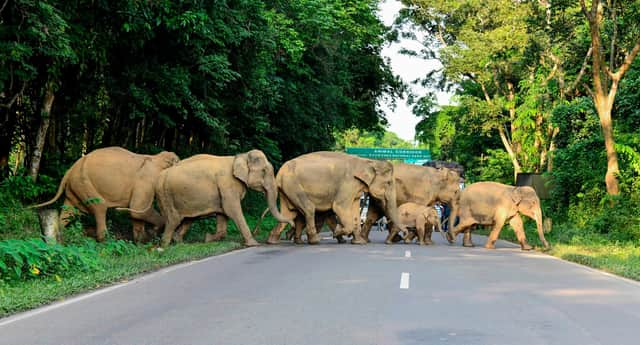Elephant tourism: Those who profit from cruel holiday 'entertainment' should face prison – Duncan McNair


I founded Save The Asian Elephants in 2015, having witnessed the most extreme violence committed on baby elephants in India to “break the spirits” for easy use in tourism – isolation, starvation, beating, stabbing, ripping. The shock was eclipsed by the outrage of learning of the leading role played by the UK market in driving and profiting from this grotesque trade.
STAE fights to protect this ancient, wondrous species. Revered by the world, numbers of Asian elephants have crashed from millions to barely 40,000 today, with 40 per cent in cruel, non-breeding captivity, routinely abused and tortured to ensure submission for ready exploitation. Now they are very highly endangered.
Advertisement
Hide AdAdvertisement
Hide AdWhat’s gone wrong? The 1960s’ explosion in package tours hugely increased elephant tourism in SE Asia, greedily promoted by travel companies indifferent to the terrible price paid by little elephants.
Stolen from the wild, their mothers killed in protecting them, their daily lot is unnatural tricks, rides and games enforced by brutal violence. A life of torment, pain and loneliness for tourism “fun”.
Broken down and ill, without shade or water, malnourished, forced to work in burning heat, they drop from exhaustion.
Tourists too pay heavily for this exploitation. Elephants when provoked attack and kill. And held in dank fetid captivity, when they exhale, sneeze and spray water they transmit lethal airborne viruses like TB, and seemingly now Covid-19, both global pandemics killing millions: all dangers concealed by the travel industry.
Asian elephants play a uniquely important role in our ecology as “megagardeners of the forests” that they nourish and sustain and on which untold species including humans rely for survival. Forests are the lungs of Earth that lock in our carbon output and combat climate change. We destroy them at our peril.
STAE’s research reveals the UK’s shameful role in this pernicious trade: over 1,200 UK companies selling 230 brutal venues through thousands of adverts. Many are members of leading trade body Abta. The figures just keep rising.
In this reckless market, “guidance” to operators, via Abta, is voluntary, full of holes, lacking any enforcement or sanctions, and widely ignored.
Self-regulation (marking your own homework) has proved futile for decades. Numerous promises of change by operators have been broken. STAE has relentlessly urged new laws to ban sales and adverts for brutal venues.
Advertisement
Hide AdAdvertisement
Hide AdGovernment has promised an Animals Abroad Bill to do just this. But it must have teeth – not just token fines for multi-billion-pound serial exploiters but potential prison terms. STAE’s purpose is to steer the market to ethical, sustainable sanctuaries where elephants exhibit natural behaviour in herds from a safe, respectful distance.
If well-framed and enforced, and not defeated by the powerful travel industry lobby against change, this law beckons real change for all species brutalised in tourism. And it is adoptable across the world, for any nation with such a gruesome market. We thank government for its promise. We hope it is in time to help save the noble Asian elephant, brought so low by Man.
Duncan McNair is a lawyer and CEO of Save The Asian Elephants
STAE has drawn up a petition to end the cruel treatment of elephants in India
A message from the Editor:
Thank you for reading this article. We're more reliant on your support than ever as the shift in consumer habits brought about by coronavirus impacts our advertisers.
If you haven't already, please consider supporting our trusted, fact-checked journalism by taking out a digital subscription.
Comments
Want to join the conversation? Please or to comment on this article.
